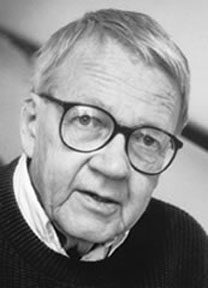One Art
BY PROF. VAROL AKMAN
Donald Justice (1925-2004)
"Before Adam ate of the fruit which made him a poet and hence an exile, not even the serpent could have questioned his sincerity. The term is inapplicable to a state of innocence."
Called by poet Dana Gioia, a former chair of the National Endowment for the Arts, "our most notable poet's poet," Donald Justice was born in Miami, Fla., in 1925. He was an only child, the son of a carpenter. Despite the overwhelming crush of the Great Depression felt by his deprived parents, he  had piano lessons. In 1942, he enrolled for a B.A. in music at the University of Miami but later realized that he had more flair as a man of letters than as a composer. His degree, taken in 1945, was not in music but in English. He then entered the University of North Carolina to study for an M.A. There he met Jean Ross, a short story writer. They got married in 1947, the year Justice earned his master's degree. He attended Stanford University for postgraduate work and, in 1954, earned a doctorate from the University of Iowa's renowned program, the Iowa Writers' Workshop. There he became friends with John Berryman, Robert Lowell, and Karl Shapiro. He worked as an academic in numerous universities but spent the longest periods of his teaching at the University of Iowa and the University of Florida at Gainesville. Justice's students make a dazzling pack, including Jorie Graham, Charles Wright, James Tate, Mark Strand, and Rita Dove.
had piano lessons. In 1942, he enrolled for a B.A. in music at the University of Miami but later realized that he had more flair as a man of letters than as a composer. His degree, taken in 1945, was not in music but in English. He then entered the University of North Carolina to study for an M.A. There he met Jean Ross, a short story writer. They got married in 1947, the year Justice earned his master's degree. He attended Stanford University for postgraduate work and, in 1954, earned a doctorate from the University of Iowa's renowned program, the Iowa Writers' Workshop. There he became friends with John Berryman, Robert Lowell, and Karl Shapiro. He worked as an academic in numerous universities but spent the longest periods of his teaching at the University of Iowa and the University of Florida at Gainesville. Justice's students make a dazzling pack, including Jorie Graham, Charles Wright, James Tate, Mark Strand, and Rita Dove.
In 1960, Wesleyan University Press published his first collection, The Summer Anniversaries. It received the Lamont Poetry Prize and was commended by Howard Nemerov in The American Scholar: "Mr. Justice is an accomplished writer, whose skill is consistently subordinated to an attitude at once serious and unpretentious." Justice's Selected Poems (1979) was awarded the Pulitzer Prize for poetry in 1980. Writing about the volume, Anthony Hecht has called him the absolute heir of Wallace Stevens and added: "His brilliance is never at the service merely of flash and display; it is always subservient to experienced truth, to accuracy, to Justice, the ancient virtue as well as the personal signature."
Recipient of grants from the Guggenheim Foundation, the Rockefeller Foundation, and the National Endowment for the Arts, Justice was awarded the 1991 Bollingen Prize for lifetime achievement in poetry. From 1997 to 2003, he served as a chancellor of the Academy of American Poets. Towards the end of his life, he was invited to be Poet Laureate of the United States. He declined the honor due to his deteriorating physical condition and died in 2004 in Iowa City. Thus, his opening line in "Variations on a Text by Vallejo," a poem written almost 30 years before his death, is probably the only time when his exactitude in expression failed him:
I will die in Miami in the sun,
On a day when the sun is very bright,
A day like the days I remember, a day like other days,
A day that nobody knows or remembers yet,
…
The following poem is from The Sunset Maker. It is the first Justice poem I read, and it is still a personal favorite. "Why this is, I'll never be able to tell you," seems to me an almost Buddhist retort to any profound question we might ask about our lives - and a gorgeous one at that. It also reminds me of an anecdote by Steven Cramer, one of Justice's students at Iowa:
He once brought in a recording by Bessie Smith, played "Nobody Knows You When You're Down and Out" without comment, then sat there. Finally, someone worked up the nerve to ask the point of this prelude to a workshop discussion. "Sometimes we need to be reminded of the value of simplicity," he said. Then class began.
Villanelle at Sundown
Turn your head. Look. The light is turning yellow.
The river seems enriched thereby, not to say deepened.
Why this is, I'll never be able to tell you.
Or are Americans half in love with failure?
One used to say so, reading Fitzgerald, as it happened.
(That Viking Portable, all water spotted and yellow --
remember?) Or does mere distance lend a value
to things? -- false, it may be, but the view is hardly cheapened.
Why this is, I'll never be able to tell you.
The smoke, those tiny cars, the whole urban milieu --
One can like anything diminishment has sharpened.
Our painter friend, Lang, might show the whole thing yellow
and not be much off. It's nuance that counts, not color --
As in some late James novel, saved up for the long weekend
and vivid with all the Master simply won't tell you.
…